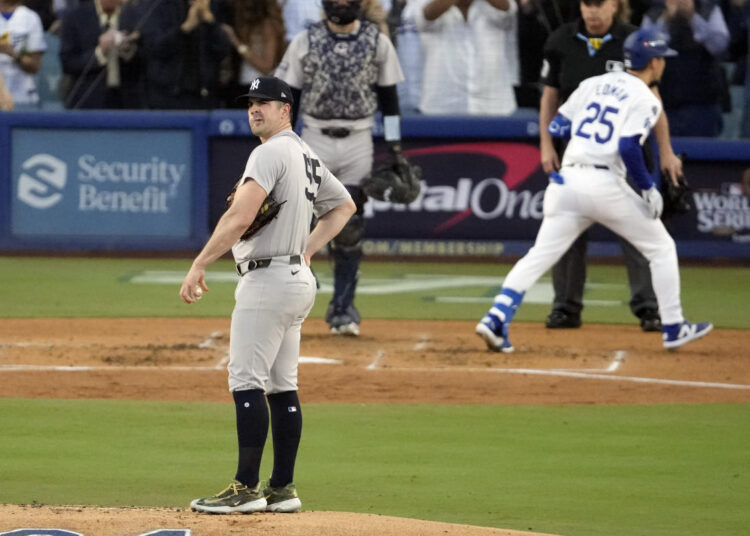LOS ANGELES — Carlos Rodón’s evening lasted an hour. It was an hour he’d love to forget.
The left-handed starter was dealt a tall task, albeit one he relished. Rodón’s Yankees lost Game 1 of this Fall Classic to the Los Angeles Dodgers in heartbreaking fashion — on the first walk-off grand slam in World Series history. It was a game New York should have won.
Rodón and the Yankees were surely hoping the sturdy hurler would deliver a gem in Game 2, one that would even the series and change the narrative. It was moments just like this that convinced general manager Brian Cashman and owner Hal Steinbrenner to invest heavily in the southpaw back in December 2022.
But in the first World Series start of his career, Rodón faltered. The Dodgers pummeled three homers in the early innings, one each from Tommy Edman, Teoscar Hernández and Freddie Freeman. Rodón exited the game in the fourth inning, having recorded just 10 outs while surrendering four earned runs. The Yankees went on to lose 4-2 and fall into an 2-0 hole in this best-of-seven.
Home runs have been Rodón’s bugaboo all year; only Kutter Crawford allowed more this regular season. When Rodón is dealing, the lefty relies on a trademark fastball that he can bully past hitters. That pitch allows his devastating slider to play up. But when he’s going bad, as was the case Saturday, Rodón gets behind in counts, making him incredibly predictable.
“Count leverage” is just a fancy name for a simple concept: Batters do way more damage when the at-bat is tilted in their favor. That dynamic is even truer for fastball-heavy pitchers such as Rodón, who tend to rely even more on heat when down in the count.
Case in point: The four biggest swings of Saturday evening — the three homers and a two-out single from Mookie Betts that led to the Hernández and Freeman blasts — all happened on fastballs with Rodón behind in the count.
His fastball is special; it is not invincible.
Even though Rodón’s heater was notably sharp in Game 2 — 1.2 mph above his season average — he got beat for three homers. His inability to land his secondary offerings meant that the Dodgers could expect a healthy heaping of fastballs. Rodón threw 60.3% four-seamers, his highest usage on the pitch since mid-April, and the Dodgers’ bats feasted.
“I thought Rodon had good stuff,” Yankees manager Aaron Boone said postgame. “Kind of looking at the homers there, we talk about this Dodger team being really good in leverage when they get ahead in the count. … They just were able to get to it in favorable counts.”
None of the game-altering pitches on Saturday were particularly heinous mistakse in and of themsleves. This was not a case of Rodón piping meatballs down the middle or hanging spinners up in the zone. He hit his intended target on all three of the homers allowed. Edman got his bat out in front of a 2-0 fastball. Hernández put a freakish swing on Rodón’s hardest pitch of the night: a 98 mph fastball up in the zone. Freeman, who provided the iconic moment in Game 1, pulled his hands inside another elevated fastball for his second homer of this World Series.
In Rodón’s first start of these playoffs, back in Game 2 of the ALDS against Kansas City, he lost control of his emotions after giving up a home run to Salvador Pérez. That’s not what happened against the Dodgers, either.
But Rodón’s pitch mix has often been critiqued for being too predictable; he threw a four-seamer or slider 75% of the time this year. In spring training, Rodón and the Yankees’ pitching brass worked on a cutter in hopes of giving the hurler another style of fastball he could utilize when behind in the count. He threw just two cutters in Game 2.
“They had a plan on to get on the fastballs,” Rodón acknowledged afterward. “I could have been better with some off-speeds. … If I showed a presence with some off-speed, I probably would have gotten off the heater.
“But, you know, they did a good job at getting to those fastballs up in the zone. They put some really good swings on them.”
In all, it was a disappointing World Series debut for Rodón. The lefty, who arrived in the Bronx coming off a sensational 2022 in which he finished sixth in NL Cy Young voting, was supposed to bolster the top of New York’s rotation. That has not, to this point, gone entirely to plan. Sure, after that clunker against Kansas City, Rodón delivered a pair of strong outings in the ALCS against Cleveland, but in the biggest start of his career, with his team needing his best, Rodón was not good enough.
“You want to go out there and put up a zero,” he said. “That’s tough. That’s the goal.”
Of course, the Yankees’ Game 2 loss is not entirely on Rodón’s broad shoulders. New York’s vaunted offense managed just one hit through the first eight innings before making a last-gasp, ninth-inning charge. Aaron Judge has struck out in six of his nine plate appearances so far in the series. Still, Rodón’s performance against the Dodgers was substandard, by any measure.
Now, any shot at redemption for the left-hander in this World Series will have to happen back here, in this unrelenting venue, in a potential Game 6. But Rodón’s teammates have a tall task in front of them to even reach that point.
It’s getting late in the Bronx, and the World Series isn’t even there yet.
Read the full article here

























